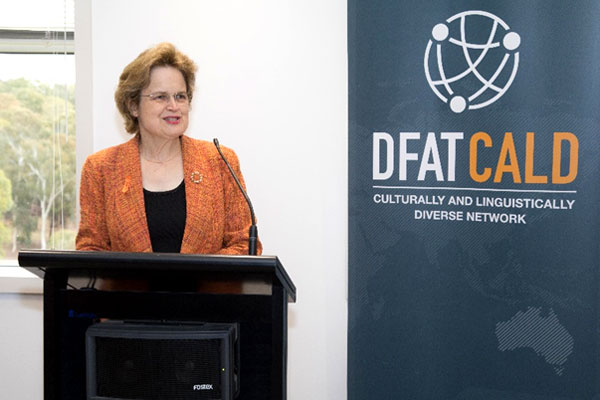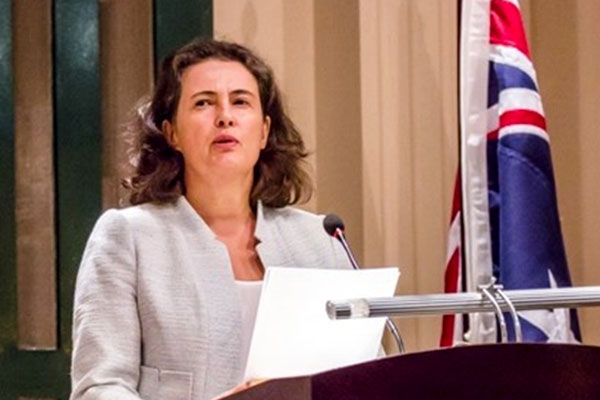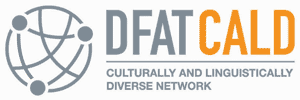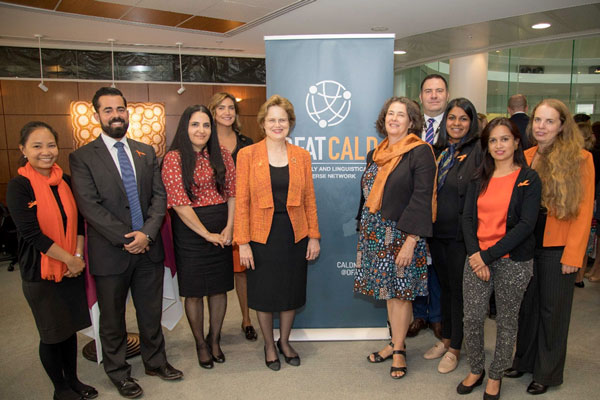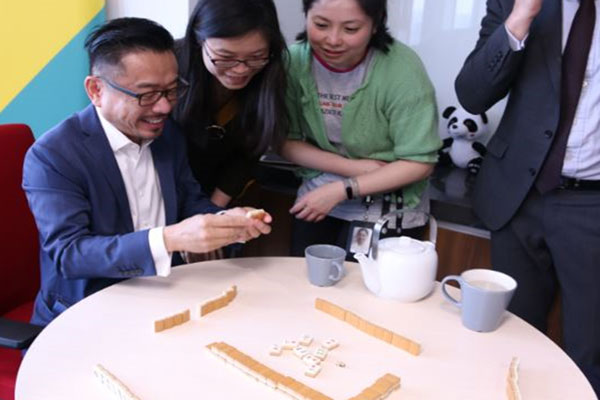Download print version
Cultural and Linguistic Diversity (CALD) Strategy 2018-2021 [PDF 1.4 MB]
Contents
Introduction
The Department of Foreign Affairs and Trade (DFAT) is committed to providing our staff with a safe and inclusive workplace. We recognise the value that colleagues from culturally and linguistically diverse (CALD) backgrounds add to our work through their skills, experiences and perspectives. A CALD workforce contributes significantly to the department promoting and protecting Australia's interests internationally by virtue of their language skills and sophisticated and nuanced cultural understanding, which assist Australia to deepen ties with other countries.
A CALD workplace means having employees who[1]:
- are from different countries, including other English-speaking countries;
- have different cultural backgrounds;
- can speak other languages besides English; and/or
- follow different religions, traditions, values and beliefs.
Australia is one of the world's most successful multicultural societies. As the Foreign Policy White Paper makes clear, our diversity is a national strength, which we embrace[2]. One in four Australians were born overseas and almost half of all Australians were either born overseas or have at least one parent born overseas[3].
It follows that as the department representing Australia to the world, with over 6,000 people across a network of over 100 overseas posts, DFAT employees should represent this diversity.
The diverse geographic footprint of our organisation is reflected in the cultural diversity of our employees, with over 110 nationalities represented in our workforce. Similarly, the department's results from the 2018 Australian Public Service Commission (APSC) Employee Census[4] for CALD indicators rightly reflect one of our most valuable assets – our CALD colleagues in Australia and overseas, including Locally Engaged Staff (LES). However, more needs to be done to fully utilise the talents and skills of staff from CALD backgrounds, and to ensure our workplaces are inclusive for all.
A key element of this strategy is to encourage colleagues from CALD backgrounds to disclose their status to improve our data and better inform our policies. We acknowledge and respect, however, that this is a personal decision and that not all colleagues will choose to do so.
The department's inaugural CALD Strategy provides a framework for our efforts to enhance CALD in our work and to identify opportunities and address barriers for CALD staff. Our aim is for DFAT to become a leader in promoting diversity and strengthening inclusion.
Message from the Secretary
I am proud to launch the department's Cultural and Linguistic Diversity (CALD) Strategy from 2018 to 2021.
Diversity is a source of strength. Just as multiculturalism has added much to the prosperity and security of Australia, so too the diversity of our staff contributes much to the department.
It is self-evident that the agency representing Australia to the world should itself be representative of Australia's cultural and linguistic diversity. Diverse experience and perspectives add value to our work, not least as we pursue the objectives of the 2017 Foreign Policy White Paper. The themes of the White Paper are opportunity, security and strength – all of which are enhanced by diversity.
Whether in Canberra or working with colleagues overseas to advance our interests, I am constantly reminded of the value diversity adds to our efforts. I want to build on this strength, and I want the department to continue to reflect and promote inclusive and respectful work practices.
I commend this Strategy to you, and look forward to receiving regular reports on its implementation.
Frances Adamson
Secretary
Message from the CALD Champion
It was a great honour to be asked by the Secretary to be the department's inaugural Cultural and Linguistic Diversity Champion. I am equally honoured to be involved in the development and launch of the CALD Staff Network and this CALD Strategy.
I have been fortunate throughout my career to work in different locations, including Fiji, the Philippines and Cambodia, and with colleagues in Australia and elsewhere from many different backgrounds and cultures. That experience has left me with a profound appreciation of different cultures, and has significantly contributed to my professional and personal development.
In preparing for my role as Champion, I reflected on the key messages contained in Australia's Multicultural Statement, Multicultural Australia - United, Strong, Successful. I share the values reflected in the Statement – respect, equality and freedom – and do my best to model them in my behaviour.
Embracing diversity and promoting an inclusive culture allows us to reach our full potential. The business case is strong. Above all, of course, it is simply the right thing to do.
The department is an inclusive workplace. This Strategy will build on that foundation, and I look forward to working with colleagues, especially from the CALD Staff Network, to unlock the full benefits of our diversity.
Alison Burrows
CALD Champion
Message from CALD Network Co-Convenors
The Culturally and Linguistically Diverse Network provides support and advocacy for CALD issues across the breadth of the department's operations, including policy development, training, access to opportunities, representation and outreach.
The CALD Network consists of the department's employees who recognise that people from different backgrounds bring different viewpoints, experiences and styles, all of which add value to the goals and outcomes of DFAT.
The CALD Network believes that enabling a culture, which encourages difference and acknowledges the value that a CALD workforce can add, will result in a more supportive, inclusive and flexible work environment. Cultural and linguistic diversity will also assist the department to support the needs of an increasingly diverse Australian society, our overseas network and the implementation of the Foreign Policy White Paper.
The Network looks forward to working with the Secretary, the CALD Champion and other colleagues on the implementation of the Strategy. The CALD Strategy provides a focus on respect and aims to ensure that DFAT remains a safe and inclusive workplace. Recognition of our CALD employees creates a positive work environment that promotes equity and diversity. These principles are critical to our success.
Ishara Davey and Hulya Koc
CALD Network Co-Convenors
Goals and actions of the CALD Strategy
The CALD Strategy, underpinned by DFAT's Values Statement, aims to promote cultural and linguistic diversity and the benefits of inclusiveness and social cohesion within our organisation and work, through:
- Valuing, promoting and increasing awareness of CALD;
- Enhancing inclusiveness within DFAT work practices; and
- Engaging with CALD staff, diversity and cultural organisations and communities.
Work to date
Our Values Statement clearly outlines that the department embraces diversity, and recognises the expertise and diverse experience of our staff.
Each year, we mark and celebrate, in addition to Christmas and Easter, events of particular significance to CALD staff, including Ramadan, Harmony Day and Citizenship Day. Posts mark days/weeks of cultural significance in their countries of accreditation.
Our LES staff make up almost half of DFAT's overall staff. They have brought invaluable diverse experience and skills to our workforces.
In 2018, we supported the establishment and launch of a CALD Staff Network, which brings together staff from CALD backgrounds, including LES, to increase awareness of and advocate for issues affecting them. We also appointed a CALD Champion at the SES Band 2 level.
I - Valuing, promoting and increasing awareness of CALD
Action:
Each year we will continue to celebrate days of significance, such as Harmony Day and Australian Citizenship Day, in Australia and at our overseas posts.
We will develop a calendar of significant diversity dates to assist with planning of departmental events to ensure they are culturally inclusive.
We will explore options to improve our data capture of CALD statistics, potentially by adopting the classification of cultural backgrounds by the Australian Human Rights Commission and its partners (Anglo-Celt, European, Non-European, and Indigenous)[5] as opposed to the current classifications in our HR systems that capture CALD data based on Non-English Speaking Background (NESB) categories[6].
We will actively encourage staff to self-identify CALD information on our HR systems using existing indicators such as NESB, ethnic group and languages. Self-identification as a member of a group is entirely voluntary and that privacy will be respected.
We will investigate how we can use data collected on our HR systems to set targets for CALD employees for our recruitment, selection, promotion and posting processes.
We will conduct a 'cultural audit' of SES/HOM/HOPs to facilitate a more accurate picture of CALD representation in senior positions.
We will support the department's CALD Champion to promote a safe and inclusive workplace that celebrates and values diversity.
Our CALD Champion will raise issues affecting CALD staff as appropriate, and engage with CALD Champion counterparts across the APS.
We will maintain and promote the availability of reflection rooms for prayer, meditation and personal reflection and accommodate days of religious significance. Managers will support staff access to leave for important cultural and religious holidays.
We will encourage staff to use tools and websites to learn more about cultures around the world, including the SBS 'Cultural Atlas'.
We will maintain language proficiency allowances to meet the operational requirements of the department, and to recognise the value of our multi-lingual workforce.
We will explore the option of formally recognising heritage languages that CALD staff have, which in many cases cannot be learnt through formal departmental language training.
II - Enhancing inclusiveness within DFAT work practices
Action:
We will continue to provide workplace diversity pre-posting briefs to employees on their first posting to ensure they are aware of the department's commitment to creating and maintaining an inclusive working environment.
We will continue to provide briefings on anti-bullying, harassment and discrimination to staff of all levels prior to their commencement on posting.
We will support a network of Diversity and Anti-Harassment Officers (DAHOs) in all work areas, both in Australia and posts overseas.
We will continue to provide training on anti-bullying, harassment and diversity to DAHOs, staff in Canberra, State and Territory Offices, Passport Offices and posts (A-based and Locally Engaged Staff).
Annually, we will review our outreach programs and advertising statistics collected from our recruitment system (currently eRecruit) to ensure our promotion of diversity reaches the widest possible audience, and encourages people of CALD backgrounds to apply for positions in DFAT.
We will continue to collect and analyse CALD data from our recruitment system (currently eRecruit) from bulk selection rounds to identify if there are particular stages at which the proportion of CALD candidates declines significantly and, if so, institute remedial actions.
We will maintain unconscious bias and diversity briefings for recruitment, selection, placement and posting committees.
We will look to expand our suite of existing CALD awareness training programs available to all staff, including potentially the Cultural Competence Program by the SBS.
Our SES leaders will model and champion inclusive behaviours and cultures, including by completing relevant cultural competency trainings and will serve as positive role models in attending and encouraging staff to attend CALD events.
We will hold ourselves accountable by completing the Workplace Cultural Diversity Tool, developed by the Australian Human Rights Commission, annually to review our CALD policies and practices.
III - Engaging with CALD staff, diversity and cultural organisations, and communities
Action:
We will promote high-level dialogue on CALD issues, including through annual 6 + 6 meetings between SES and CALD staff and through participation by staff Diversity Network Representatives on our Workplace Relations Committee (WRC).
We will support the department's CALD Network and its activities to promote diversity and inclusion. Suggestions and ideas from across the Network will be used to inform the 6 + 6 meetings and raised with the WRC.
We will encourage CALD staff, through the Network, to set up informal mentoring arrangements with more senior staff.
We will encourage LES staff to join the CALD Staff Network and put forward views and suggestions towards CALD issues.
We will consider CALD representation when deciding nominations for Boards and Councils associated with the department.
We will actively promote inclusive consultations processes across DFAT, to ensure that all staff have a voice, not only on issues specifically relevant to CALD.
We will maintain our membership with the Diversity Council of Australia, and draw on its resources to support the CALD Strategy.
We will join the National Anti-Racism Partnership, Racism. It stops with me, and contribute to the Government's National Anti-Racism Strategy as a further demonstration of our commitment to tolerance and anti-racism.
We will look for opportunities to engage diplomatic representatives based in Canberra, diaspora and DFAT spouses/families from CALD backgrounds in events, including lectures and other discussion forums.
We will consult LES staff in updating Post Reports to ensure cultural practices and sensitivities are appropriately reflected.
We will encourage posts to arrange discussion sessions where LES and A-based can share information and experiences about cultural practices of significance.
We will ensure our social media, DFAT website, reports and advocacy materials showcase a diverse department.
Holding ourselves accountable
In consultation with the CALD Network, the CALD Champion will meet with business areas responsible for implementation every six months to review progress, as detailed in the implementation matrix at Attachment A. The Champion will report on the outcome of these meetings to the Secretary and the CALD Network.
Annually, we will publish an Administrative Circular advising staff of progress in implementing the Strategy, which will include data and information on:
- CALD staff, based on the Census results;
- CALD applicants in selection processes and representation in selection process outcomes;
- CALD composition of our staff in total and by level;
- language proficiency of our staff;
- number and type of CALD promotional activities in the past 12 months;
- implementation of outcomes of CALD 6 + 6 dialogues and CALD-related discussions at the Workplace Relations Committee; and
- support for CALD Staff Network activities.
The CALD Strategy will be reviewed towards the end of 2021.
Attachment A – implementation matrix
These actions will be implemented in accordance with associated timelines and operational requirements.
| Action | Responsibility | Timeline |
|---|---|---|
| Continue to celebrate days of significance in Australia and at our overseas posts. | MPS | Ongoing |
| Develop a calendar of significant diversity dates to assist with planning of departmental events to ensure they are culturally inclusive. | MPS | By 31 December 2018 |
| Explore options to improve our data capture of CALD statistics, potentially by adopting the classification of cultural backgrounds by the Australian Human Rights Commission and its partners. | WPS; MPS; HSS | By June 2019 |
| Encourage staff to self-identify CALD information on our HR systems using existing indicators such as NESB, ethnic group and languages. | WPS; MPS; HSS; CALD Network | Ongoing |
| Investigate how we can use data collected on our HR systems to set targets for CALD employees for our recruitment, selection, promotion and posting processes. | WPS; MPS; HSS | By October 2019 |
| Conduct a 'cultural audit' of SES/HOM/HOPs to facilitate a more accurate picture of CALD representation in senior positions. | MPS | By March 2019 |
| Support the department's CALD Champion to promote a safe and inclusive workplace that celebrates and values diversity. | MPS; CALD Champion | Ongoing |
| CALD Champion to raise issues affecting CALD staff as appropriate, and engage with CALD Champion counterparts across the APS. | CALD Champion | Ongoing |
| Maintain and promote the availability of reflection rooms for prayer, meditation and personal reflection and accommodate days of religious significance. | OPO; MPS | Ongoing |
| Encourage staff to use tools and websites to learn more about cultures around the world. | MPS; DAC | Ongoing |
| Maintain language proficiency allowances to meet the operational requirements of the department, and to recognise the value of our multi-lingual workforce. | DAC | Ongoing |
| Explore the option of formally recognising heritage languages that CALD staff have, which in many cases cannot be learnt through formal departmental language training. | DAC; MPS | By June 2020 |
| Action | Responsibility | Timeline |
|---|---|---|
| Continue to provide workplace diversity briefs to employees on their first posting to ensure they are aware of the department's commitment to creating and maintaining an inclusive working environment. | MPS | Twice weekly - ongoing |
| Continue to provide briefings on anti-bullying, harassment and discrimination to staff of all levels prior to their commencement on posting. | EES; MPS | Weekly - ongoing |
| Support a network of Diversity and Anti-Harassment Officers (DAHOs) in all work areas, both in Australia and posts overseas. | EES; MPS | Ongoing |
| Continue to provide training on anti-bullying, harassment and diversity to DAHOs, staff in Canberra, State and Territory Offices, Passport Offices and posts (A-based and locally engaged staff). | EES; MPS | Ongoing |
| Review our outreach programs and advertising statistics collected from our recruitment systems to ensure our promotion of diversity reaches the widest possible audience, and encourages people of CALD backgrounds to apply for positions in DFAT. | RCS | Annually |
| Continue to collect and analyse CALD data from our recruitment systems from bulk selection rounds to identify if there are particular stages at which the proportion of CALD candidates declines significantly and, if so, institute remedial actions. | RCS; MPS | Ongoing |
| Maintain unconscious bias and diversity briefings for recruitment, selection, placement and posting committees. | SFB; MPS | Ongoing |
| Look to expand our suite of existing CALD awareness training programs available to all staff. | MPS; DAC | By March 2019 |
| SES leaders to model and champion inclusive behaviours and cultures, including by completing relevant cultural competency trainings and will serve as positive role models in attending and encouraging staff to attend CALD events. | SES leaders; MPS | Ongoing |
| Complete the Workplace Cultural Diversity Tool, developed by the Australian Human Rights Commission, annually to review our CALD policies and practices. | MPS | By March 2019 |
| Action | Responsibility | Timeline |
|---|---|---|
| Promote high-level dialogue on CALD issues, including through annual 6 + 6 meetings between SES colleagues and staff from CALD backgrounds and through participation by staff Diversity Network Representatives on our Workplace Relations Committee. | MPS | March annually |
| Support the department's CALD Staff Network and its activities to promote diversity and inclusion in our organisation. | CALD Champion; MPS | Ongoing |
| Encourage CALD staff, through the Network, to set up informal mentoring arrangements with more senior staff. | CALD Champion; MPS;
CALD Network |
Ongoing |
| Encourage LES staff to join the CALD Staff Network and put forward views and suggestions towards CALD issues. | Posts
CALD Network |
Ongoing |
| Consider CALD representation when deciding nominations for Boards and Councils associated with the department. | MPS; relevant line areas | Ongoing |
| Promote inclusive consultations processes across DFAT, to ensure that all staff have a voice, not only on issues specifically relevant to CALD. | CALD Network; MPS; All divisions | Ongoing |
| Maintain our membership with the Diversity Council of Australia, and draw on its resources to support the CALD Strategy. | MPS | Annually |
| Join the National Anti-Racism Partnership, Racism. It stops with me, and contribute to the Government's National Anti-Racism Strategy. | MPS | By December 2018 |
| Look for opportunities to engage diplomatic representatives based in Canberra, diaspora and DFAT spouses/families from CALD backgrounds in events including lectures and discussions. | MPS | By October 2019 |
| Consult LES staff in updating Post Reports to ensure cultural practices and sensitivities are appropriately reflected. | Posts; LSS | By December 2018 |
| Encourage posts to arrange regular discussion sessions where LES and A-based can share information and experiences about cultural practices of significance. | Posts | Ongoing |
| Ensure our social media, DFAT website, reports and advocacy materials showcase a diverse department. | SCD; Posts; EXB; All divisions | Ongoing |
[1] https://www.business.gov.au/info/run/employ-people/employ-people-from-culturally-and-linguistically-diverse-backgrounds
[1] 2017 Foreign Policy White Paper - Chapter 1 and Chapter 8
[3] http://www.abs.gov.au/ausstats/abs@.nsf/lookup/Media Release3
[4] Nearly 50 per cent of our staff who responded identified as being born in another country and/or speak a language other than English at home. Both of these indicators are categories used by the APSC and the ABS to identify CALD.
[5] Leading for Change: A Blueprint for Cultural Diversity and Inclusive Leadership Revisited (2018)
[6] Currently NESB reporting is required by the APSC, which describes employees as NESB 1 and NESB 2
- NESB 1 refers to people born overseas who arrived in Australia after the age of five and whose first language was not English (migrants).
- NESB 2 refers to children of migrants including:
- those who were born overseas and arrived in Australia when they were aged five or younger but did not speak English as a first language
- those who were Australian born but did not speak English as a first language and had at least one parent that did not speak English as a first language
- those who were Australian born and had neither parent speaking English as a first language.

